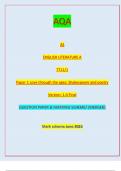AQA
AS
ENGLISH LITERATURE A
7711/1
Paper 1 Love through the ages: Shakespeare and poetry
Version: 1.0 Final
,AS
ENGLISH LITERATURE A
Paper 1 Love through the ages: Shakespeare and poetry
Thursday 18 May 2023 Morning Time allowed: 1 hour 30 minutes
Materials
For this paper you must have:
• an AQA 12-page answer book.
Instructions
• Use black ink or black ball-point pen.
• Write the information required on the front of your answer book. The Paper Reference is 7711/1.
• Do all rough work in your answer book. Cross through any work you do not want to be marked.
• Answer one question from Section A and one question from Section B.
Information
• The maximum mark for this paper is 50.
• The marks for questions are shown in brackets.
• You will be marked on your ability to:
– use good English
– organise information clearly
– use specialist vocabulary where appropriate.
• In your response you need to:
– analyse carefully the writers’ methods
– explore the contexts of the texts you are writing about
– explore connections across the texts you have studied
– explore different interpretations of your texts.
IB/H/Jun23/E6 7711/1
, 2
Section A: Shakespeare
Answer one question from this section.
Either
0 1 Othello – William Shakespeare
Read the extract from Othello, provided below, and respond to the following:
• How does Shakespeare present aspects of love in this extract?
• Examine the view that, in this extract and elsewhere in the play, Shakespeare presents
Iago as a character whose intelligence makes us like him rather than condemn him.
[25 marks]
IAGO Come on, come on: you are pictures out of doors,
bells in your parlours, wild-cats in your kitchens, saints
in your injuries, devils being offended, players in your
housewifery, and housewives in your beds.
DESDEMONA
O, fie upon thee, slanderer!
IAGO
Nay, it is true, or else I am a Turk:
You rise to play and go to bed to work.
EMILIA
You shall not write my praise.
IAGO No, let me not.
DESDEMONA
What wouldst thou write of me, if thou shouldst praise
me?
IAGO
O, gentle lady, do not put me to’t,
For I am nothing if not critical.
DESDEMONA
Come on, assay. There’s one gone to the harbour?
IAGO
Ay, madam.
DESDEMONA
(aside) I am not merry, but I do beguile
The thing I am by seeming otherwise.
Come, how wouldst thou praise me?
IAGO
I am about it, but indeed my invention
Comes from my pate as birdlime does from frieze –
It plucks out brains and all. But my muse labours,
And thus she is delivered.
If she be fair and wise, fairness and wit,
The one’s for use, the other useth it.
DESDEMONA
Well praised! How if she be black and witty?
IB/H/Jun23/7711/1
, 3
IAGO
If she be black, and thereto have a wit,
She’ll find a white that shall her blackness fit.
DESDEMONA
Worse and worse.
EMILIA How if fair and foolish?
IAGO
She never yet was foolish that was fair,
For even her folly helped her to an heir.
DESDEMONA These are old fond paradoxes to make fools
laugh i’th’alehouse. What miserable praise hast thou for
her that’s foul and foolish?
IAGO
There’s none so foul and foolish thereunto,
But does foul pranks which fair and wise ones do.
DESDEMONA O heavy ignorance! Thou praisest the worst
best. But what praise couldst thou bestow on a deserving
woman indeed? One that in the authority of her merit
did justly put on the vouch of very malice itself?
IAGO
She that was ever fair and never proud,
Had tongue at will, and yet was never loud;
Never lacked gold, and yet went never gay;
Fled from her wish, and yet said ‘Now I may’;
She that being angered, her revenge being nigh,
Bade her wrong stay, and her displeasure fly;
She that in wisdom never was so frail
To change the cod’s head for the salmon’s tail;
She that could think and ne’er disclose her mind:
See suitors following and not look behind:
She was a wight, if ever such wight were –
DESDEMONA
To do what?
IAGO
To suckle fools and chronicle small beer.
DESDEMONA
O, most lame and impotent conclusion!
Do not learn of him, Emilia, though he be thy husband.
How say you, Cassio, is he not a most profane and
liberal counsellor?
CASSIO He speaks home, madam; you may relish him more
in the soldier than in the scholar.
(Act 2, Scene 1)
Turn over for the next question
Turn over ►
IB/H/Jun23/7711/1




